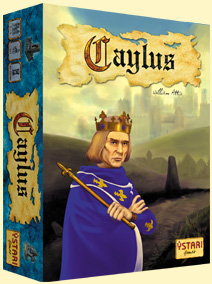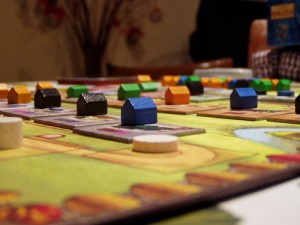Review: Caylus
Posted by James (admin) on September 9th, 2010
 I had played Caylus: Magna Carta before (the smaller, card-based version of Caylus) but not the original big game so I was looking forwards to playing this.
I had played Caylus: Magna Carta before (the smaller, card-based version of Caylus) but not the original big game so I was looking forwards to playing this.
During the game, players place their workers on various buildings so they can generate resources and cash which they can then use to build further buildings and generate victory points. First, players take turns placing their workers on the available buildings. Only one player can use each building during a round, so timing your placement of your workers can be agonising (in a good way) because you always want to place your workers in multiple places at once (always a good sign in a worker placement game) before someone else does. When all players have passed, the buildings get resolved in order (moving along the road that leads out of the castle). Some buildings generate resources (food, wood, stone, cloth, gold), some generate cash, and some have special effects like allowing a player to build a new building, changing the turn order, allowing a player to buy a resource for cash, trade gold for victory points, and so on. New buildings can be used in later turns by any of the players and the person who built it receives extra VPs each time another player uses that building – so whilst your building may help others you can get benefit from that too.
As well as building new buildings, the players are jointly building the castle too. Building the castle can earn you royal favours which can gain you VPs, cash, etc. and the accumulated reward for further favours increases with the more favours you earn. If you build a lot of castle sections, there are extra rewards for you too; if you haven’t built a single piece of a castle section, you lose VPs – the king doesn’t like a slacker.
Essentially that is the game and the most VPs wins. It doesn’t sound too complex but there’s a lot of things to balance and a large amount of choice – choices about how to score VPs, which building to build, where to place your workers, which buildings to place your workers on first, when to use resources building the castle, when to use workers to give you advantages instead of resources. One clever mechanic is that some of the most recently placed buildings may not even activate during a turn (determined by the players’ actions) even if a worker has been placed so there is an element of risk in some placements.
Note that the player’s turn order doesn’t change unless you use a worker on a specific building to affect it. I know now that in my game I should have paid the cash and the worker to boost my turn order position a lot sooner because going last each round means the choice of buildings when placing workers is already limited and it severely reduced the amount of resources I could acquire.
 Overall, Caylus is a worker placement game as well as a resource management game. You need to plan how to combine your workers’ actions together, so deciding where to place your workers first is critical and you often need to adapt your plan when another player uses a building you were hoping to use. The rush to grab buildings each turn is very tense. Balancing gaining resources with spending cash is very important and tricky. Running out of cash can be difficult to recover from, and it seemed it can be worth spending a round trying to put yourself in a better position (generate cash, improve turn order) compared to trying to keep scraping something from a weak position.
Overall, Caylus is a worker placement game as well as a resource management game. You need to plan how to combine your workers’ actions together, so deciding where to place your workers first is critical and you often need to adapt your plan when another player uses a building you were hoping to use. The rush to grab buildings each turn is very tense. Balancing gaining resources with spending cash is very important and tricky. Running out of cash can be difficult to recover from, and it seemed it can be worth spending a round trying to put yourself in a better position (generate cash, improve turn order) compared to trying to keep scraping something from a weak position.
Resources are very tight indeed which means Caylus is an unforgiving game. This isn’t a bad thing on its own but it does mean your first game or two could be difficult and less regular gamers may struggle. Having played the Magna Carta version, I recognised the basics, but I did make a few errors – one in particular on my first turn really affected me and I played catch-up for the rest of the game.
Despite my poor performance though, I do like Caylus as there’re lots of interesting tactics to consider – even the decision on when to pass (and take no more actions that round) can be of tactical importance because your passing may mean other players now can’t afford to place their workers as they wished. I think Caylus is more suited to serious gamers than casual ones because there are so many aspects to think about. Caylus was a meaty challenge and I’ll enjoy playing it again (and hopefully learn from my mistakes).
James.
[Played with 4 players]
Note about ‘Caylus: Magna Carta’ version: The extra options that are in Caylus but not in the simplified Magna Carta version (primarily the castle building and royal favours) add extra complexity and decisions to Caylus but make the game longer and harder. As a result, I think the Magna Carta version is equally as good because it contains the core gameplay, feels just as tense, is quicker to play and can appeal to a broader audience (although still not light gamers).


September 9th, 2010 at 1:38 am
[…] Review: Caylus […]
September 9th, 2010 at 12:19 pm
I think it’s a important to note that Caylus is THE original worker placement game. It started the trend and in my opinion no game has done it better since.
I think I’ll have to try Magna Carta now… Great review!